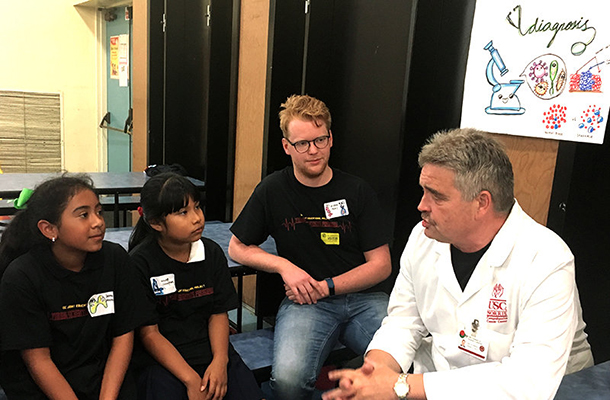Ten-year-old Sade Session plunged her hand into a large cardboard box and began carefully feeling its contents. She was trying to detect something that felt different, something that stood out. Suddenly she stopped and nodded and withdrew her hand.
“What did you feel?” asked Martin Kast, PhD, professor of molecular microbiology and immunology, obstetrics and gynecology, and urology at Keck School of Medicine of USC. “Something hard,” the fifth-grader replied. “Everything else was soft, but then I felt something hard.”
Inside the box were dozens of ice packs — all unfrozen, and thus soft, except for one, which was frozen solid, representing a possible tumor. That, Kast explained to Session, is what women need to look for when doing a breast self-exam — a hard lump in a mass of soft tissue.
This diagnostic experiment was just one of many at the Medical Superstars Workshop, a cancer education event for fourth- and fifth-grade students hosted by USC Dornsife’s Young Scientists Program. Funded by the USC Norris Comprehensive Cancer Center, the workshop was held on Oct. 23 at Lenicia B. Weemes Elementary School, near USC’s University Park Campus.
The workshop created an important opportunity for children to learn about cancer, said Dieuwertje “DJ” Kast, USC Dornsife’s Joint Educational Project STEM Program Manager and director of the Young Scientists Program. DJ Kast is Martin Kast’s daughter.
“Due to its prevalence, many children have experienced cancer within their own family,” she said. “We want the students participating in the workshop to hear from people who are on the front lines of cancer research, prevention and treatment as well as from people who are afflicted by cancer.”
Science and care
During the workshop, the grade-schoolers rotated between four stations. At the biotechnology station, they learned how to use an endoscope and conducted an experiment mimicking robotic surgery.
At another station, students made two decorative pillows, one for a child with cancer and one to take home and keep.
Students also made DNA helixes with gummy bears and toothpicks; explored gene testing using their sense of taste; and looked through microscopes to see differences between healthy and cancer cells.
They learned life skills on how to help prevent cancer, from healthy eating to getting enough sleep to going for regular check-ups.
The workshop brought together cancer researchers and survivors from different ethnic backgrounds, so that underrepresented minority students could hear the narratives from researchers and survivors who look like them.
Ghecemy Lopez, a cancer survivor, tossed back her long mane of black hair as she explained to students that although chemotherapy may cause patients to lose their hair, it will grow back.
Sylvia Kast, a breast cancer survivor and DJ Kast’s mother, wore a Wonder Woman costume to tell students about the importance of showing love to cancer patients to help them heal.
Igniting the spark
Data from the National Institutes of Health (NIH) and the National Cancer Institute show that minorities are seriously underrepresented in the cancer field.
To encourage young people, especially those from underrepresented minorities, to choose careers in cancer medicine or research, Martin Kast argued, it’s important to teach them about cancer from a young age.
“You have to ignite that spark as early as possible,” he said.
By high school, he added, it’s usually too late.
“When we start early, these kids are open and enthusiastic about what they’re doing. This will form their choices when they grow up and could result in many more underrepresented minorities choosing a career not only in science, but potentially in the cancer fields — either in medicine as a doctor who treats cancer or as a scientist who studies it.”
To that end, USC Norris Comprehensive Cancer Center, together with USC Dornsife’s Joint Educational Project have collaborated to launch a cancer education program aimed at students in kindergarten through 12th grade. The program kicked off in February 2018 with pilot workshops for students in first- through third-grade classes at four schools in the USC Family of Schools.
Once expanded to seven schools, the program will reach some 3,000 students, Martin Kast said.
It also provides teaching opportunities and classroom experience for USC undergraduates and graduate students who are interested in careers as science teachers.
The Kasts, together with Anupam Singh, a USC Dornsife doctoral student studying molecular and computational biology, co-wrote the cancer education curriculum. They also wrote a paper outlining these initiatives that was recently published in the peer reviewed journal Connected Science Learning.
They also submitted a grant proposal together with co-investigators Frederick Freking and Morgan Polikoff of USC Rossier School of Education. USC Rossier’s Masters of Arts in Teaching program will use the curriculum as a teaching tool. They also plan to disseminate the program through education networks to reach 30,000 teachers nationwide.
Easing fears
DJ Kast said she wanted kids to be able to see some of the science of cancer so it doesn’t scare them as much.
“Ultimately that’s what we’re trying to do — lower that threshold of apprehension about cancer,” she said. “Cancer sucks, but there are ways to help support people who are battling it and the people who are trying to cure it.”
The program already seems to be achieving its goals. After the workshop, a young African-American student announced that she wants to be a cancer researcher or a doctor when she grows up.
“My grandpa was diagnosed with cancer and that made me very sad,” she said. “Today I can learn how he got the cancer cells so I can help him one day so that he doesn’t get sick again.”
— Susan Bell


